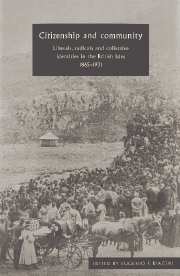 Citizenship and Community
Citizenship and Community Book contents
- Frontmatter
- Contents
- List of contributors
- Acknowledgements
- Introduction: Citizenship, liberty and community
- Part I Citizenship, populism and liberalism
- Part II Economic democracy and the ‘moral economy’ of free trade
- Part III Democracy, organicism and the challenge of nationalism
- Part IV Consciousness and society: the ‘peculiarities of the British’?
- 14 Platonism, positivism and progressivism: aspects of British sociological thought in the early twentieth century
- Index
14 - Platonism, positivism and progressivism: aspects of British sociological thought in the early twentieth century
Published online by Cambridge University Press: 16 September 2009
- Frontmatter
- Contents
- List of contributors
- Acknowledgements
- Introduction: Citizenship, liberty and community
- Part I Citizenship, populism and liberalism
- Part II Economic democracy and the ‘moral economy’ of free trade
- Part III Democracy, organicism and the challenge of nationalism
- Part IV Consciousness and society: the ‘peculiarities of the British’?
- 14 Platonism, positivism and progressivism: aspects of British sociological thought in the early twentieth century
- Index
Summary
For the past thirty years social and intellectual historians have puzzled over the question of why there was no sociological theory in Britain: of why it was that, in the late nineteenth and early twentieth centuries, when sociology was being established as a major theoretical enterprise and academic discipline in many other western countries, in Britain alone sociological theory remained weak, peripheral and largely unacknowledged both by the universities and by the wider intelligentsia. Why, so it has often been asked, were there no great British analysts of society and social action, comparable in range and method to such theorists as Weber, Durkheim, Mosca, Pareto and the authors associated with the ‘Chicago school’: theorists who fundamentally challenged and changed the way in which people interested in social questions thought about social cohesion, social conflict, social stratification and social transformation? That Britain had once had a ‘grand theorist’ in the person of Herbert Spencer is not denied: but though Spencer lived till 1903, his work after the 1860s is widely dismissed as moribund and wholly out of tune with the intellectual revolution of the late nineteenth century. Similarly, it is not denied that there was a ‘sociological movement’ in late-Victorian, Edwardian and inter-war Britain, nor that, rather surprisingly, Britain was the first country in the world to have a nationally based ‘Sociological Society’ (founded by Patrick Geddes and Victor Branford in 1904). But this movement is usually portrayed as an insignificant and largely amateur affair, tainted with post-Gladstonian faddism, and excessively concerned with questions of moral improvement, civic consciousness and social reform.
- Type
- Chapter
- Information
- Citizenship and CommunityLiberals, Radicals and Collective Identities in the British Isles, 1865–1931, pp. 343 - 360Publisher: Cambridge University PressPrint publication year: 1996
- 4
- Cited by


